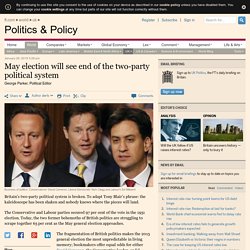

BBC iWonder - Is the party over for Britain's mainstream politicians? Britain’s two-party political system isn’t working. The debates prompted by the Panama Papers, while usefully illuminating the extraordinary corruption of many foreign leaders, may have distracted us from the real problem in Britain.

Unlike in Russia or China, the corruption in British politics does not stem from those in power abusing their position for personal enrichment. Instead, it comes from the structure of our decaying political system. Propped up by money from vested interests, the rigid two-party straitjacket has left the UK with a malfunctioning democracy and led to widespread public disillusionment. It doesn’t have to be this way. It’s clear that people are looking for a new kind of politics that goes beyond traditional party lines: a politics first and foremost of engagement and transparency, not reducible to the old left-right divide. Change is long overdue.
In today’s age of nearly unlimited information, our world views are nuanced and sophisticated, but our creaking democratic processes struggle to reflect this. How democratic are the UK’s political parties and party system? In the latest instalment of the 2016 Audit of UK Democracy, Sean Kippin, Patrick Dunleavy and the DA team examine how democratic the UK’s party system and political parties are.
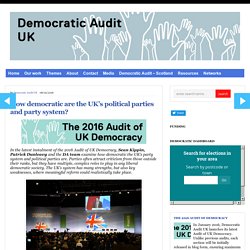
Parties often attract criticism from those outside their ranks, but they have multiple, complex roles to play in any liberal democratic society. The UK’s system has many strengths, but also key weaknesses, where meaningful reform could realistically take place. What does democracy require for political parties and a party system? Recent Developments Political parties in the UK are normally stable organizations. In Scotland, the SNP built on its mobilization during the 2014 referendum campaign to take all but three Westminster seats there. Following Ed Miliband’s immediate resignation, a lack-lustre field Labour leadership in the leadership competition revealed a huge gulf of ideas and views between Labour’s parliamentary party and most of its members (recently enlarged by the introduction of a £3 membership fee).
Brexit: Who governs Britain? This is the UK's new 10-party system. Who governs Britain?

Farage? Boris? Britain’s evolving multi-party system(s) Throughout the short campaign, this blog will publish a series of posts that focus on each of the electoral regions in the UK.
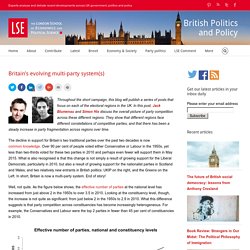
In this post, Jack Blumenau and Simon Hix discuss the overall picture of party competition across these different regions. They show that different regions face different constellations of competitive parties, and that there has been a steady increase in party fragmentation across regions over time. The decline in support for Britain’s two traditional parties over the past two decades is now common knowledge. Over 90 per cent of people voted either Conservative or Labour in the 1950s, yet less than two-thirds voted for these two parties in 2010 and perhaps even fewer will support them in May 2015. Well, not quite. Britain’s two-party political system isn’t working. The debates prompted by the Panama Papers, while usefully illuminating the extraordinary corruption of many foreign leaders, may have distracted us from the real problem in Britain.
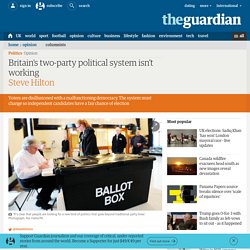
Unlike in Russia or China, the corruption in British politics does not stem from those in power abusing their position for personal enrichment. Instead, it comes from the structure of our decaying political system. Propped up by money from vested interests, the rigid two-party straitjacket has left the UK with a malfunctioning democracy and led to widespread public disillusionment. It doesn’t have to be this way. It’s clear that people are looking for a new kind of politics that goes beyond traditional party lines: a politics first and foremost of engagement and transparency, not reducible to the old left-right divide. Change is long overdue. In today’s age of nearly unlimited information, our world views are nuanced and sophisticated, but our creaking democratic processes struggle to reflect this. Will the grip of the two-party system ever be broken? Clacton by-election: Is this the day politics changes for ever? For all those differences, today’s two by-election dramas will be played out against the same backdrop, two smaller stories that form part of a longer epic told in a single chart.
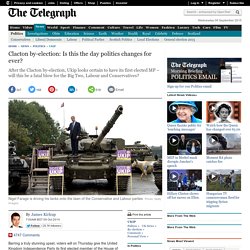
That chart, arguably the most significant in British politics, shows the share of the vote taken by the two big political parties. In the 1951 general election, the Conservatives and Labour between them won 96.8 per cent of votes cast, the two parties dominating the political system utterly. Since then, though, the big two have been in slow decline, their combined vote drifting relentlessly down as smaller challengers rise to steal away their support. Explicit cookie consent. THE distance between the front benches in Britain’s House of Commons, it is said, is that of two drawn swords: it is a fittingly archaic and combative conceit.
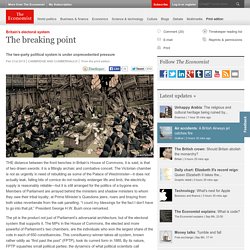
The Victorian chamber is not as urgently in need of rebuilding as some of the Palace of Westminster—it does not actually leak, falling bits of cornice do not routinely endanger life and limb, the electricity supply is reasonably reliable—but it is still arranged for the politics of a bygone era. Members of Parliament are arrayed behind the ministers and shadow ministers to whom they owe their tribal loyalty; at Prime Minister’s Questions jeers, roars and braying from both sides reverberate from the oak panelling. “I count my blessings for the fact I don’t have to go into that pit,” President George H.W.
Bush once remarked. General Election 2015 – Britain’s Evolving Multi-Party System(s) Throughout the short campaign, this blog will publish a series of posts that focus on each of the electoral regions in the UK.
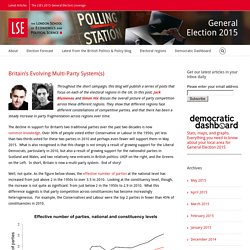
In this post, Jack Blumenau and Simon Hix discuss the overall picture of party competition across these different regions. They show that different regions face different constellations of competitive parties, and that there has been a steady increase in party fragmentation across regions over time. May election will see end of the two-party political system. Business of politics: Conservatives' David Cameron, Liberal Democrats' Nick Clegg and Labour's Ed Miliband.
